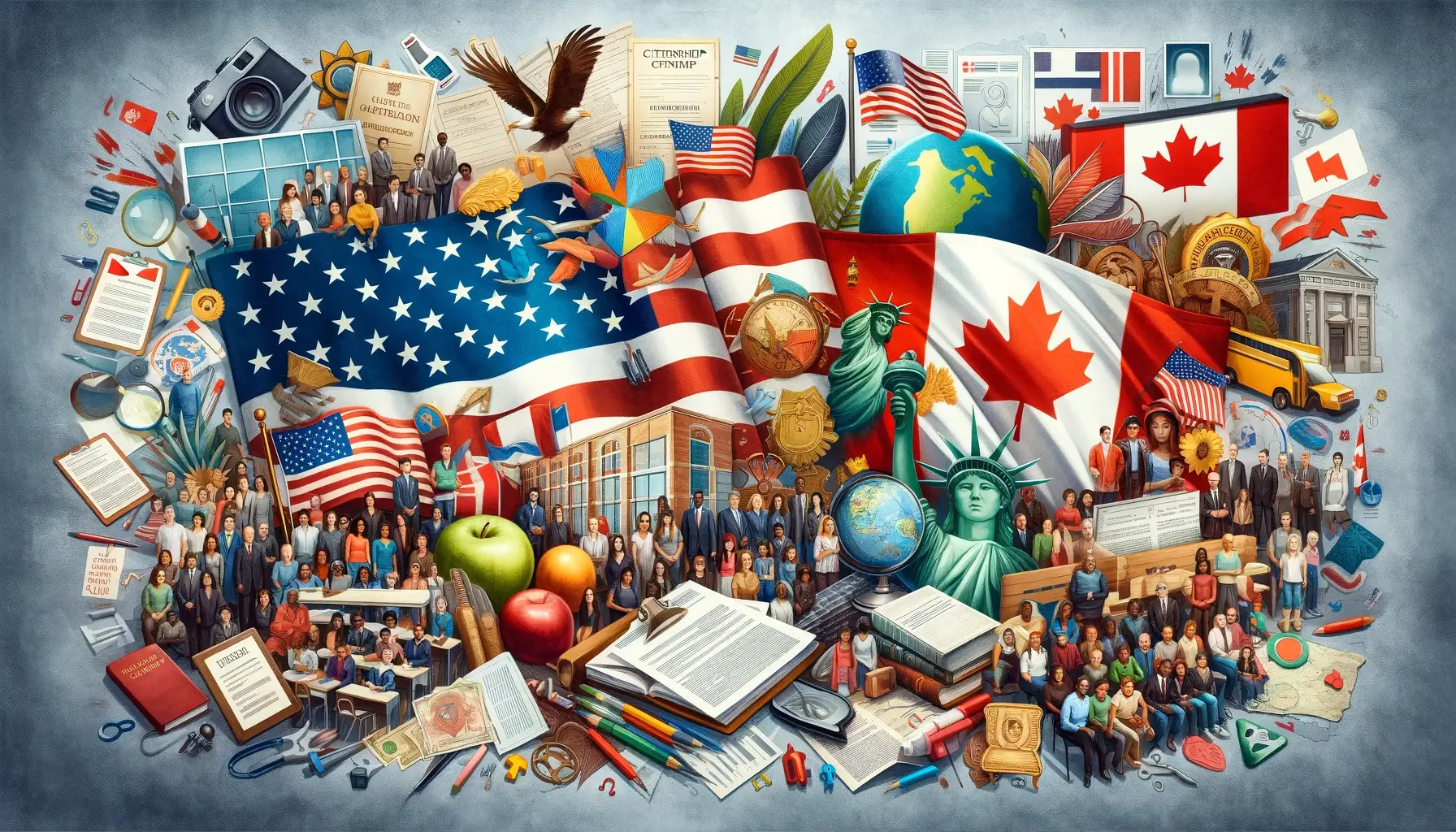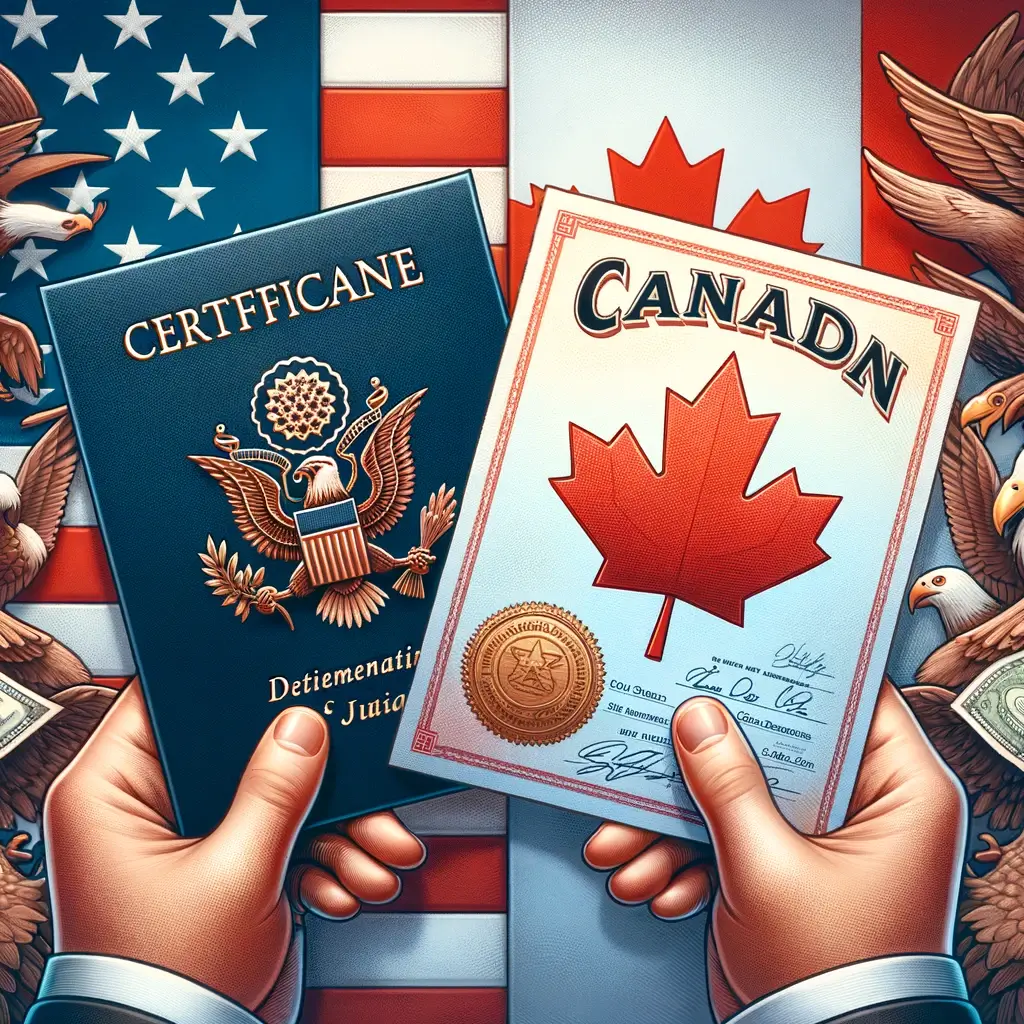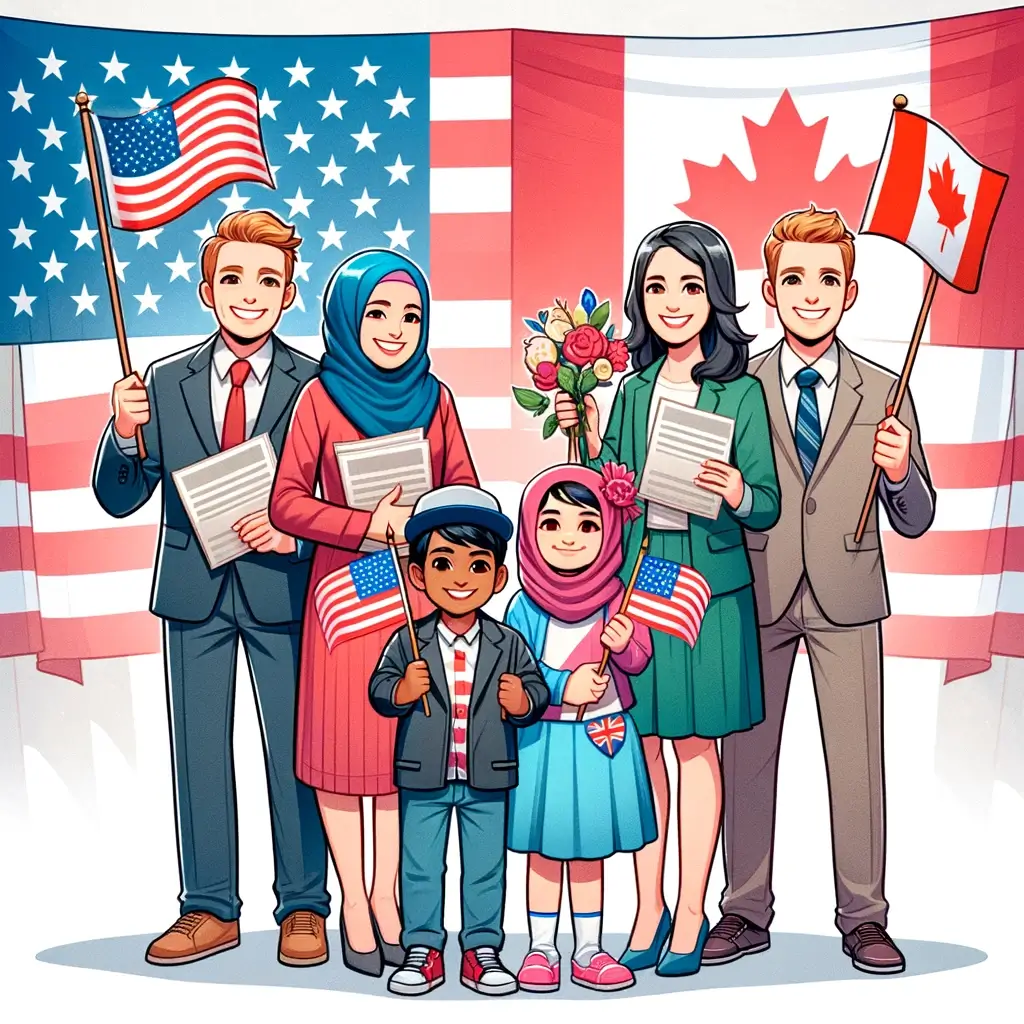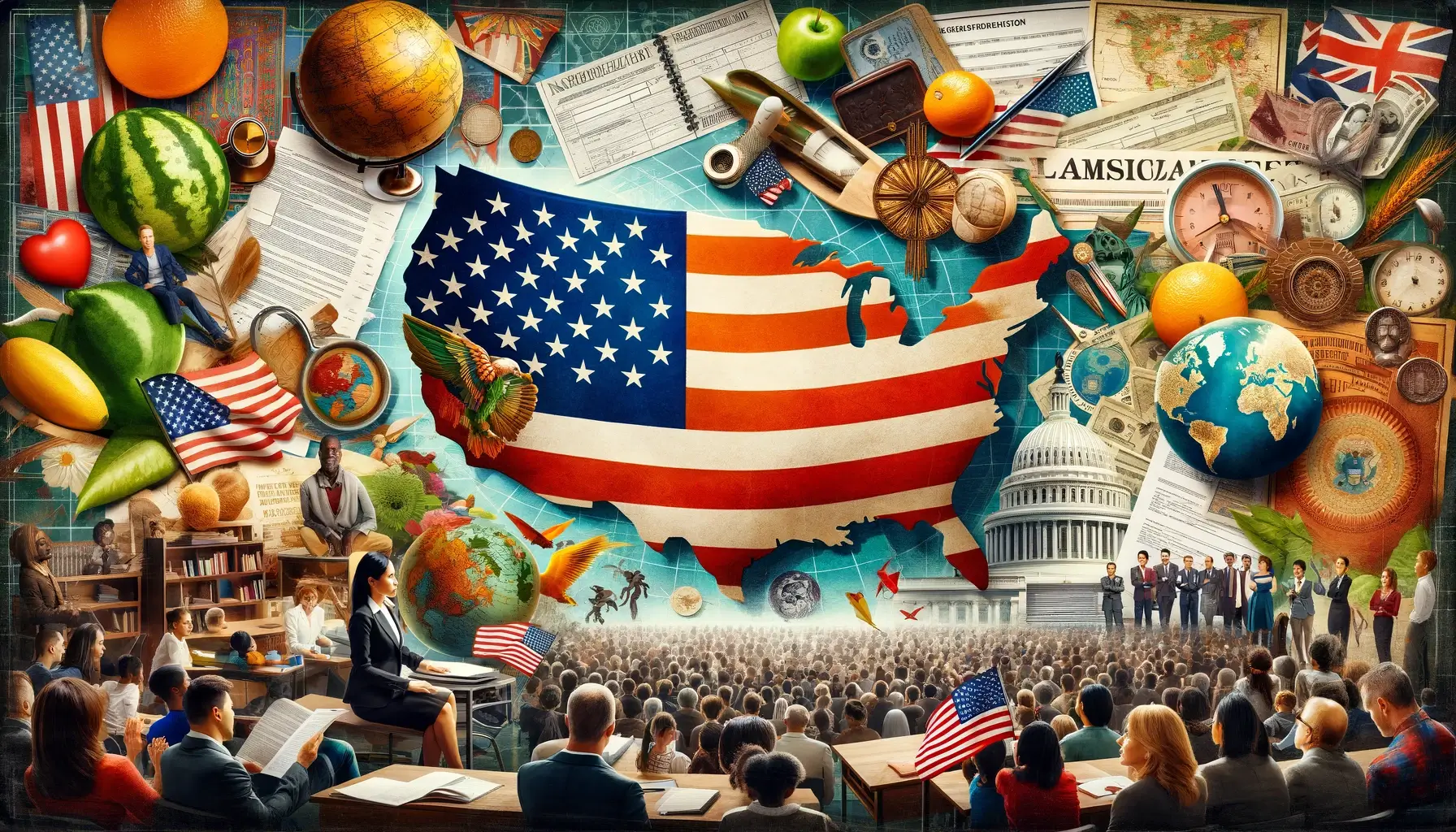Naturalization vs Citizenship: Difference and Comparison
Your Quick 30-Second Answer to Naturalization vs Citizenship!
Naturalization and citizenship are two key concepts in immigration law often confused. Naturalization is a process where a foreign national obtains U.S. citizenship by fulfilling certain criteria, such as being a permanent resident for a minimum period, demonstrating good moral character, and having a basic understanding of English and U.S. history. It includes an interview, civics test, English test, and an oath of allegiance. Citizenship, on the other hand, can be acquired either by birth in the U.S. or through U.S. citizen parents. It doesn’t require the naturalization process. Both naturalized citizens and those who acquire citizenship have the same legal rights within the U.S., but the paths to achieving them differ significantly. Naturalization involves actively meeting specific requirements, while citizenship acquisition is often automatic, based on the circumstance of birth or parentage.
For an in-depth overview, please see the "Table of Contents" below.
Key Differences Explained: Naturalization vs Citizenship
Welcome to this guide on "Naturalization vs Citizenship." Dive into the differences between these terms and explore the nuances of "Naturalization" and "Citizenship" in Canada and the U.S.
TABLE OF CONTENT
Introduction and Overview
1. Naturalization vs Citizenship
2. Understanding Citizenship
3. Difference between the Two
Naturalization Process Explained
4. Naturalization (U.S.A)
5. Naturalization (Canada)
6. Eligibility for Naturalization
Governmental Roles and Legalities
7. Government and Agencies
8. Dual Citizenship Aspects
Sociocultural Aspects of Citizenship
9. Embracing New Identities
Resources and Assistance
10. Common Questions (FAQs)
11. Where to Find Resources

1. Overview: Naturalization vs Citizenship
Naturalized Citizenship (Naturalization) and Derived Citizenship (Citizenship) are two different ways of acquiring citizenship, each with its unique processes and criteria:
Naturalized Citizenship:
1. Definition: Naturalized citizenship is obtained through a legal process in which a non-citizen voluntarily becomes a citizen of a country. This is typically done after meeting certain residency and legal requirements.
2. Process:
- Residency Requirement: Applicants usually need to have lived in the country for a specified period.
- Application: Involves submitting a formal application, passing a citizenship test (in some countries), and attending an interview.
- Oath of Allegiance: Often concludes with taking an oath of allegiance to the country.
3. Eligibility: Generally, adults who have legally lived in the country for a set number of years and have demonstrated good moral character, knowledge of the country’s language, and understanding of its history and government.
4. Voluntary Action: The individual actively chooses to apply for and acquire citizenship.
Derived Citizenship:
1. Definition: Derived citizenship is automatically granted to individuals based on their relationship to a citizen, typically through birth to citizen parents or adoption by citizen parents.
2. Process:
- Automatic at Birth: Often occurs at birth, either within the territory of the country (jus soli) or to citizen parents regardless of birthplace (jus sanguinis).
- Through Adoption: In some cases, children adopted by citizens can derive citizenship from their adoptive parents.
3. Eligibility: Generally for children born to citizen parents or children adopted by citizens of a country.
4. Passive Acquisition: The individual does not actively apply; citizenship is automatically conferred by law based on familial relationships.
Key Differences:
- Method of Acquisition: Naturalization is an active, application-based process, while derivation is automatic, often based on birth or family relations.
- Eligibility Criteria: Naturalization requires meeting residency and legal criteria, whereas derivation is based on the citizenship status of parents or adoptive parents.
- Age Considerations: Naturalization is typically for adults, while derived citizenship usually applies to minors.
Both forms of citizenship grant the same legal rights and responsibilities but differ significantly in their acquisition process. Visit following page to learn more about difference between Permanent Residency (PR) and citizenship in Canada.
2. Understanding Citizenship (USA and Canada)

Natural Born Citizens: Natural born citizens are individuals who acquire U.S. citizenship by birth, either within the territory of the United States or through US parents. They hold citizenship by virtue of their birth circumstances and are not required to undergo the naturalization process. This status is enshrined in the U.S. Constitution and distinguishes natural born citizens from those who become citizens through the naturalization process. Canada, known for its welcoming stance on immigrants and diverse culture, allows dual citizenship, making it a prime destination for those seeking the benefits of belonging to more than one nation.
Our detailed exploration of naturalization vs citizenship delves into the diverse legal frameworks of each country, shaping the journey from permanent residency to full citizenship
U.S. Citizenship Explained
In the United States, citizenship represents far more than a legal status. It signifies a commitment to the principles and ideals enshrined in the U.S. Constitution, a document that has stood as the cornerstone of American democracy and societal structure. This status is not just about the rights it bestows, such as holding a U.S. passport, a powerful symbol of freedom and opportunity, or the privilege of participating in democratic processes. It's about embracing a set of responsibilities and values that define what it means to be American.
American citizenship can be acquired in multiple ways, primarily through birth or naturalization. Each method comes with its own set of criteria and processes, outlined in various legal frameworks like the Fourteenth Amendment and governed by agencies such as the U.S. Department of Homeland Security. For those born outside the United States, the journey to citizenship through naturalization involves a comprehensive understanding of U.S. law, successful navigation of the immigration process, and often, the guidance and support of legal representation.
But what does it mean to be an American citizen? It's a question that encompasses a range of factors - from the rights to vote, to participate in federal elections, to the responsibilities of upholding the laws and contributing positively to the community. It's about being part of a narrative that's continuously evolving, shaped by every individual who becomes a part of this nation, whether as a natural-born citizen or a naturalized one.
The process of naturalization in the U.S. is a testament to the country’s commitment to diversity and inclusion. It's a path lined with specific eligibility requirements, each designed to ensure that new citizens are prepared to fully engage with and contribute to their new homeland. From understanding the U.S. Constitution to passing the civics test, each step in the naturalization process is a building block towards becoming a full-fledged American citizen.
Canadian Citizenship Explained
Canadian citizenship, much like its American counterpart, is a blend of rights, responsibilities, and cultural identity. It embodies the values enshrined in Canada's legal framework and reflects the country's rich tapestry of multiculturalism. Becoming a Canadian citizen means more than just enjoying the benefits of a Canada passport; it signifies an active participation in the country's social, economic, and political life. The naturalization vs citizenship comparison is more than just legal terminology; it's about understanding the cultural, social, and legal implications of becoming a citizen in a new country.
The path to Canadian citizenship can be navigated through several avenues, the most common being naturalization. This process, similar yet distinct from that of the United States, is guided by the Nationality Act and overseen by Immigration, Refugees and Citizenship Canada (IRCC). For those not born in Canada, obtaining citizenship involves meeting specific criteria, including a period as a lawful permanent resident, demonstrating language proficiency through an English or French test, and understanding the fundamental tenets of Canadian society and government.
But Canadian citizenship is more than a legal status; it’s a sense of belonging to a community that values diversity, inclusivity, and mutual respect. It’s about embracing Canadian values and contributing to the country’s ongoing narrative. Whether it’s through participation in national events, engaging in local communities, or contributing to the country’s diverse cultural landscape, Canadian citizenship offers a unique opportunity to be part of a progressive and welcoming nation.
Moreover, Canadian citizenship comes with its responsibilities. From voting in elections to respecting the rights and freedoms of fellow citizens, it’s about playing an active role in shaping the nation’s future. For many, the journey towards Canadian citizenship is a poignant reflection of their aspirations and commitment to their new home.
The naturalization process in Canada is designed to ensure that new citizens are not only aware of their rights but also understand their responsibilities. It includes steps like the citizenship test, which assesses knowledge of Canadian history, values, institutions, and symbols. The naturalization ceremony, a pivotal moment in this journey, is where the oath of allegiance is taken, marking the transition from permanent resident to Canadian citizen.
3. Naturalization vs Citizenship: Difference
Understanding the distinction between 'Naturalization vs Citizenship' in the context of United States or Canada requires navigating a variety of legal terms, processes, and governmental structures. Each aspect, from acquiring Canadian or U.S. citizenship to the issuance of a Canadian or U.S. passport, plays a vital role in this intricate process.
Naturalization vs Citizenship
The primary distinction between naturalization and citizenship revolves around how an individual acquires the status. U.S. citizenship is automatically granted to those born in the United States or in certain U.S. territories, as well as to individuals born to parents who were U.S. citizens at the time of their birth. These individuals inherently possess all rights and responsibilities associated with U.S. citizenship, without the need for additional legal steps. A Citizenship Certificate is issued to individuals who gain citizenship by birth within the United States or through U.S. Citizen Parents, signifying their automatic entitlement to U.S. citizenship.
Conversely, a Certificate of Naturalization is awarded to those who achieve U.S. citizenship through the naturalization process, a path typically pursued by foreign nationals or permanent residents. U.S. citizenship can be attained after birth through the process of naturalization. This process, governed by the Immigration and Nationality Act (INA), allows foreign citizens or nationals to become U.S. citizens after meeting specified requirements.
Among the most common queries we address, understanding the distinction between naturalization vs citizenship stands out as crucial for prospective citizens. Let us dive into the differences between naturalization and natural-born citizenship, clarifying the specific rights and privileges associated with each.
4. Naturalization Explained (U.S.A)

Naturalization is the legal process through which a foreign citizen can voluntarily become a naturalized citizen of the United States. This process involves several key steps and entities:
- Eligibility and Application: To be eligible for naturalization, applicants must have been a permanent resident for a minimum of five years, or three years if filing as a spouse of a U.S. citizen, among other criteria, including Military Service under specific conditions. Additionally, those with U.S. citizen parents residing outside the U.S. can also qualify, subject to meeting all necessary eligibility requirements.
- Naturalization Service: A segment of the U.S. government, typically conducted under the auspices of the U.S. Department of Homeland Security, responsible for handling naturalization applications.
- Declaration of Intention and Certificates of Naturalization: Important legal documents in the naturalization process. A declaration of intention is an initial step for many applicants, while certificates of naturalization are issued as official proof of U.S. citizenship upon the successful completion of the process.
- Federal and Local Courts: These courts often play a role in the naturalization process, especially as courts of record for legal proceedings related to citizenship.
- U.S. Law and U.S. Constitution: The legal framework governing naturalization vs citizenship, ensuring adherence to the principles and values outlined in the U.S. Constitution.
- Government Agency Involvement: Agencies like the U.S. Department of State and the U.S. Department of Homeland Security are instrumental in overseeing the naturalization process, upholding the terms of use for various immigration services.
Citizenship: A Broader Concept
Citizenship, on the other hand, encompasses a broader scope. Exploring the naturalization vs citizenship process is essential for immigrants to understand their path towards becoming a national member in the U.S. or Canada:
- U.S. Citizenship: This can be acquired by birth (natural born citizen) or through naturalization. It comes with certain rights (like holding a U.S. passport) and responsibilities (such as abiding by U.S. law).
- U.S. Citizen Parent: U.S. citizenship can be derived or acquired at birth through U.S. citizen parents, under certain conditions.
- U.S. Nationals: This term includes citizens and non-citizen nationals, the latter primarily being persons born in American territories (like the U.S. Virgin Islands).
- U.S. Government and Official Government Organization: These entities define and regulate the policies related to citizenship, including the process for those seeking naturalization.
The Online Dimension
- Secure Websites and Use of the Service: The U.S. government provides online resources for applicants, including secure websites where individuals can access information and services related to citizenship and naturalization.
Documentation and Representation
- Certificate File: Important for keeping records of naturalization vs citizenship documents.
- U.S. House of Representatives: Plays a role in shaping immigration and naturalization laws.
- Federal Courts in Citizenship: Federal courts in the United States play a crucial role in the citizenship process by overseeing legal proceedings related to citizenship matters. They handle cases such as those involving declarations of intention, ensuring that applicants meet the requirements set forth by U.S. law and government agencies.
In summary, while naturalization is a specific legal process for a foreign citizen to become a naturalized U.S. citizen, citizenship is a broader concept that encompasses both natural-born and naturalized citizens, each governed by U.S. law and policies set forth by the U.S. government and its various agencies. The role of U.S. parents, the legalities processed through federal and local courts, and the documentation managed by official government organizations all contribute to the rich tapestry of U.S. citizenship.
Naturalization Process in the United States
The naturalization process in the United States represents a critical pathway for foreign citizens to attain American citizenship. This process is a blend of legal procedures, civic understanding, and personal commitment, governed by the U.S. Constitution and overseen by the U.S. Department of Homeland Security, particularly the United States Citizenship and Immigration Services (USCIS).
To begin, prospective applicants must first meet certain eligibility criteria. This includes being a lawful permanent resident (commonly known as a green card holder) for a specific period, demonstrating good moral character, and having a basic understanding of English. The application process officially starts with the submission of Form N-400, the Application for Naturalization, a crucial document that initiates the applicant's journey towards becoming a naturalized U.S. citizen.
The naturalization process also involves a civics test, a pivotal requirement designed to assess the applicant's knowledge of U.S. history, government, and the rights and responsibilities of citizenship. This test, along with an English language test, ensures that applicants not only understand the legal aspects of U.S. citizenship but are also prepared to actively participate in the nation’s civic life.
A unique aspect of the U.S. naturalization process is the inclusion of a naturalization ceremony. This ceremony is more than a formal event; it is the moment where applicants take the Oath of Allegiance to the United States, marking their official transition from permanent residents to U.S. citizens. The naturalization certificate received at this ceremony is a tangible testament to their new status.
Throughout this process, applicants may seek legal advice or assistance from a naturalization lawyer, especially in cases involving complex legal issues or sensitive information. These legal professionals can provide guidance on navigating the federal laws and requirements of the naturalization process.
The naturalization process in the U.S. is not just a procedural journey; it's a transformative experience. It symbolizes the federal government's commitment to welcoming new citizens into the fold, reinforcing the diverse and dynamic nature of the American society. When discussing naturalization vs citizenship, it's important to note the differences in rights, responsibilities, and legal status that come with each term. For many, this journey, culminating in the acquisition of a U.S. passport, is a dream realized, opening doors to new opportunities and a future full of potential.
5. Naturalization Explained (Canada)

Naturalization in Canada is the legal process through which a foreign citizen can voluntarily become a Canadian citizen.
When discussing naturalization vs citizenship, it's important to note the differences in rights, responsibilities, and legal status that come with each term.
This process involves several key steps:
- Eligibility and Application: Applicants must first check their eligibility, which includes being a permanent resident (PR) in Canada, living in Canada for at least 1,095 days (3 years) in the 5 years before the application, filing income tax, and having adequate knowledge of English or French. Applicants can choose to apply online or on paper and select the type of citizenship certificate (electronic or paper) they wish to receive upon successful application.
- Permanent Resident Status: It's essential to have PR status in Canada and ensure that it's not under review or subject to conditions that might affect eligibility for citizenship.
- Language Skills: Applicants between 18 and 54 must demonstrate an adequate knowledge of English or French, equivalent to level 4 of the Canadian Language Benchmarks (CLB) for English or Niveaux de compétence linguistique Canadian (NCLC) for French.
- Citizenship Test and Oath of Citizenship: Applicants must pass a citizenship test covering topics like the rights and responsibilities of Canadian citizens, Canada's history, geography, economy, government, laws, and symbols. Those 14 years and older must also take the Oath of Citizenship.
- Prohibitions: Certain situations, such as having committed a crime, may prevent one from becoming a Canadian citizen for a specific period.
Citizenship: A Broader Concept (Canada)
Canadian Citizenship can be acquired by birth or through naturalization. It comes with certain rights, such as holding a Canadian passport, and responsibilities, like abiding by Canadian law. Citizenship can also be derived or acquired at birth through Canadian parents under specific conditions.
The Online Dimension (Canada)
- The Canadian government provides online resources for applicants, including secure websites where individuals can access information and services related to citizenship and naturalization. This guide provides a detailed breakdown of naturalization vs citizenship, offering clear insights for those navigating their citizenship journey in North America.
Documentation and Representation (Canada)
- The process involves maintaining a file of important documents and understanding the role of entities like the Canadian House of Commons in shaping immigration and naturalization laws. Federal courts in Canada play a crucial role in overseeing legal proceedings related to citizenship matters.
In conclusion, while naturalization is a specific legal process for a foreign citizen to become a Canadian citizen, citizenship is a broader concept that encompasses both natural-born and naturalized citizens, each governed by Canadian law and policies set forth by the Canadian government and its various agencies.
Naturalization Process in Canada
The journey to Canadian citizenship through naturalization is a distinct and structured process, reflective of Canada's commitment to multiculturalism and inclusivity. Governed by the Nationality Act and administered by Immigration, Refugees and Citizenship Canada (IRCC), this process caters to foreign citizens seeking to become proud members of Canadian society.
Eligibility for Canadian naturalization involves certain prerequisites. Applicants must have been lawful permanent residents in Canada, often referred to as PR Card holders, for a specified duration. They must demonstrate proficiency in either of the country's official languages, English or French, through a language test. Moreover, the demonstration of good moral character is a non-negotiable criterion, reflecting the importance Canada places on the integrity and character of its prospective citizens.
The application process for Canadian naturalization involves thorough documentation and adherence to specific procedures. This includes the completion and submission of relevant forms and the careful collation of required documents, such as proof of residence and identity. A critical aspect of this process is the Canadian citizenship test, designed to assess the applicant's knowledge of Canadian history, values, institutions, and symbols.
A significant and final step in the naturalization process is the citizenship ceremony. This event is not just a formality but a deeply symbolic moment. Here, applicants take the Oath of Allegiance to Canada, marking their formal induction as Canadian citizens. The ceremony is a celebration of Canada's cultural diversity and a welcome into the Canadian family, complete with the presentation of the citizenship certificate.
Throughout this process, applicants might engage the services of an immigration attorney or consult official websites for guidance, ensuring their application aligns with the legal requirements set out by the Canadian government. The role of the IRCC is pivotal in this journey, ensuring a fair and transparent process for all applicants.
In essence, the naturalization process in Canada is more than a legal transition; it is an embrace of Canadian values and a commitment to contribute to the country's ongoing narrative. For many, obtaining a Canada passport through naturalization is not just about the freedom of travel; it symbolizes a new identity and belonging to a nation known for its welcoming spirit and opportunities for all.
6. Eligibility for Naturalization and Citizenship Application

Eligibility for Naturalization
Eligibility criteria play a significant role in the naturalization vs citizenship process, affecting how applicants navigate their path to becoming citizens.
In the United States
The road to US citizenship through naturalization is paved with specific eligibility requirements. Central to these is the status of being a lawful permanent resident, commonly referred to as a green card holder. Applicants are generally required to have lived in the U.S. for at least five years (or three years in cases of spouses of U.S. citizens), exhibiting continuous residence and physical presence.
Good moral character is another cornerstone of eligibility. This is assessed through various means, including background checks and interviews, to ensure adherence to the principles of U.S. law. Prospective citizens must also demonstrate an understanding of the English language and pass a civics test, reflecting their knowledge of U.S. history and government as outlined in the U.S. Constitution.
In Canada
Similar to the U.S., Canada's naturalization requirements include a period of permanent residence. PR Card holders must have lived in Canada for at least 1,095 days out of the five years before applying. Demonstrating language proficiency in English or French, Canada's official languages, is also a prerequisite.
Canada places a strong emphasis on the knowledge of Canadian values, history, symbols, and institutions, tested through the Canadian citizenship test. Like the U.S., good moral character is a critical factor, and applicants must not have any prohibitive conditions such as serious criminal history or immigration fraud.
Citizenship Application Process
In the United States
The application process for U.S. citizenship begins with submitting Form N-400, followed by biometrics collection and a subsequent interview. During the interview, the USCIS officer will assess the application, test the applicant's knowledge of English and U.S. civics, and review their background.
The process culminates in the naturalization ceremony, where applicants take the Oath of Allegiance. This ceremony is more than a formal requirement; it is a significant moment symbolizing the applicant's full integration into the fabric of American society.
In Canada
In Canada, the application process involves submitting a detailed application package, including all necessary documents and forms. Following the application, individuals are required to attend an interview and take the Canadian citizenship test.
The final step in Canada is also a citizenship ceremony, where the Oath of Citizenship is taken, marking the formal entry into Canadian society as a full citizen. This moment is celebrated as a milestone in the journey of every new Canadian.
7. The Role of Government and Agencies

The process of naturalization in both the United States and Canada is intricately tied to various government agencies and departments. These entities play critical roles in facilitating, regulating, and overseeing the journey of foreign nationals towards becoming citizens.
When discussing naturalization vs citizenship, it's important to note the differences in rights, responsibilities, and legal status that come with each term.
In the United States
In the U.S., the primary agency responsible for the naturalization process is the United States Citizenship and Immigration Services (USCIS), a branch of the U.S. Department of Homeland Security. USCIS administers the naturalization application process, from the initial filing of Form N-400 to conducting the interview and the naturalization test. This agency is vital in ensuring that the process adheres to the principles and requirements outlined in U.S. immigration law and the U.S. Constitution.
The federal government, through USCIS, also provides various resources to assist applicants. These include study materials for the civics test, information sessions, and online tools available on official government websites. These resources are designed to guide applicants through the process, ensuring they are well-prepared and informed.
In Canada
In Canada, Immigration, Refugees and Citizenship Canada (IRCC) is the primary body overseeing the naturalization process. This federal agency manages the application process, ensuring that all applicants meet the specific eligibility criteria outlined in the Nationality Act. IRCC is also responsible for organizing the citizenship test and the final oath-taking ceremony.
The Canadian government provides extensive support to prospective citizens. This includes access to official websites that offer comprehensive information on the application process, eligibility criteria, and preparation resources for the citizenship test. These online platforms are essential for providing transparent and accessible information to applicants, helping them navigate the complexities of the naturalization process.
Commonalities and Differences
Both the USCIS and IRCC are committed to maintaining the integrity of their respective naturalization processes. They ensure that applicants not only meet the legal requirements but also understand the responsibilities and privileges of citizenship. While each country has its unique legal framework and procedures, the overarching goal is similar – to welcome new citizens who are prepared to contribute positively to their new home.
8. Dual Citizenship and Complex Cases

The naturalization vs citizenship comparison is more than just legal terminology; it's about understanding the cultural, social, and legal implications of becoming a citizen in a new country.
The realms of naturalization in both the U.S. and Canada encompass not only straightforward cases but also scenarios that involve dual citizenship and other complex situations. Navigating these cases requires a deep understanding of both countries' laws and policies. Dual Citizenship in the U.S. and Canada
In the United States
The United States allows for dual citizenship, which means a naturalized U.S. citizen can retain citizenship of another country. However, this status comes with specific considerations, especially regarding loyalty obligations and the potential for conflicts of interest. Understanding the U.S. government's stance on dual nationality, as outlined in U.S. law, is crucial for those who wish to maintain dual citizenship.
For U.S. nationals, particularly those in territories like Puerto Rico and the U.S. Virgin Islands, the nuances of dual citizenship can be complex. These individuals often navigate a unique set of rules regarding their status and rights as U.S. citizens.
In Canada
Canada also recognizes dual citizenship, allowing individuals to retain their original nationality alongside Canadian citizenship. This policy reflects Canada's multicultural ethos and acknowledges the diverse backgrounds of its citizens. However, dual citizens must be aware of their obligations to both countries, particularly in legal and civic responsibilities.
Handling Complex Cases
In the United States
In the U.S., complex naturalization cases might involve issues like previous immigration violations, sensitive information, or unclear eligibility due to unique circumstances. In such situations, the role of a naturalization lawyer becomes crucial. Legal professionals can provide guidance on navigating federal laws and addressing specific challenges that may arise during the naturalization process.
In Canada
Similarly, in Canada, complex cases may include issues such as unclear residency status, past legal difficulties, or complications arising from dual citizenship. Here, immigration attorneys and official government organizations, like IRCC, play a vital role in providing clarity and support. They ensure that applicants receive fair consideration and that their cases are handled in accordance with Canadian immigration law.
9. Embracing New Identities in the U.S. and Canada

As we conclude this exploration of 'Naturalization vs Citizenship' from the perspectives of the United States and Canada, it’s essential to reflect on the profound implications of these processes for individuals and societies alike. The journey to U.S. citizenship or Canadian citizenship is more than a legal transition; it is an embracing of new identities, values, and communities. Additionally, Canada values family unification, so demonstrating strong family ties within Canada, or the ability to bring and support family members, can be a positive factor. This aligns with Canada’s emphasis on family and community as core components of society.
In the United States, acquiring U.S. citizenship is a pivotal moment in an individual's life. It involves a series of steps, from initial consultations on a gov website to the acquisition of a U.S. passport. This journey is guided by the principles enshrined in the U.S. Constitution, ensuring every naturalized U.S. citizen shares in the country's legacy. The U.S. Department of State, along with other government agencies like the U.S. Department of Homeland Security, play crucial roles in this process, safeguarding the integrity and solemnity of U.S. law.
The significance of naturalization in the U.S. is recorded meticulously in naturalization records, housed in the National Archives. These documents are not just proof of citizenship; they are historical records of individuals' commitments to their new country. The certificates of citizenship issued are a testament to the legal process and the rigorous standards upheld by courts of record and official government organizations.
For many, the place of birth may be in a foreign country, but their allegiance and dedication lie with the U.S. This journey often involves an English test, declarations of intention, and sometimes, military service, reflecting a broad spectrum of paths to becoming part of the citizens of the United States. The role of U.S. citizen parent(s) is also instrumental, often guiding their children to become native-born citizens or aiding them in the naturalization applications.
The acquisition of citizenship in the U.S. is not just a legal change; it marks a transformation in citizenship status. For those in territories like the U.S. Virgin Islands or U.S. nationals elsewhere, this can mean a significant shift in their civic identity. The fiscal year may dictate the flow of naturalization applications, with each application marked by an average time, a biometric fee, and an attorney-client relationship that navigates the complexities of the Basic Naturalization Act.
In Canada, the process mirrors many of these steps, with its own unique nuances. Canadian naturalization power lies in its ability to weave diverse threads into the fabric of the nation. Each naturalized citizen, whether they come through family sponsorship or as skilled workers, adds to the mosaic of Canadian society.
In both nations, these processes underscore the main difference between merely residing in a country and fully belonging to it. The journey to U.S. or Canadian citizenship is one of commitment, resilience, and a willingness to embrace new opportunities and challenges – a journey that countless individuals and families embark on every year, driven by dreams of a better life and a desire to contribute to their new home. The naturalization vs citizenship comparison is more than just legal terminology; it's about understanding the cultural, social, and legal implications of becoming a citizen in a new country.
10. Common Questions (FAQs) about The Naturalization vs Citizenship

How does the naturalization process impact one's existing citizenship status in another country?
How does the naturalization process impact one's existing citizenship status in another country?
Naturalization in the U.S. doesn't automatically revoke citizenship in another country. However, it's important to check the laws of the home country, as some nations do not permit dual citizenship.
What are the subtle cultural expectations for naturalized citizens in the U.S. compared to natural-born citizens?
What are the subtle cultural expectations for naturalized citizens in the U.S. compared to natural-born citizens?
Naturalized citizens might encounter different societal expectations in the U.S. Key areas of focus include integrating into the community, understanding social norms, and engaging in civic duties.
Can extensive travel outside the U.S. during the Permanent Residency period affect my naturalization eligibility?
Can extensive travel outside the U.S. during the Permanent Residency period affect my naturalization eligibility?
Yes, extensive travel can impact naturalization eligibility. Applicants need to demonstrate physical presence in the U.S. for a specified period, and lengthy absences might interrupt this residency continuity.
How do changes in political climate influence the naturalization process?
How do changes in political climate influence the naturalization process?
Political changes can affect immigration policies and attitudes towards immigrants. Staying informed about current policies and seeking legal advice when necessary is crucial during the naturalization process.
What unique challenges do children of naturalized citizens face compared to their parents?
What unique challenges do children of naturalized citizens face compared to their parents?
Children of naturalized citizens often deal with identity issues, balancing their cultural heritage with their American identity. They also inherit the citizenship status of their parents, influencing their legal and social experiences in the U.S.
How can applicants use their time during permanent residency to strengthen their naturalization application?
How can applicants use their time during permanent residency to strengthen their naturalization application?
Applicants should build a strong community presence, improve English proficiency, and familiarize themselves with U.S. history and government. Volunteering and local event participation can also demonstrate commitment.
In what ways can naturalization impact professional opportunities in the U.S.?
In what ways can naturalization impact professional opportunities in the U.S.?
Naturalization broadens employment opportunities, including access to government jobs and professional licenses, which are often restricted to U.S. citizens. It also offers job stability.
What are the financial implications of the naturalization process?
What are the financial implications of the naturalization process?
The naturalization process involves application fees, potential legal costs, and possibly travel expenses for biometrics or interviews. Financial preparation for these expenses is essential.
How does naturalization affect eligibility for U.S. government benefits and social services?
How does naturalization affect eligibility for U.S. government benefits and social services?
Naturalized citizens gain full access to U.S. social services and benefits, including voting rights and eligibility for federal jobs and social security benefits, unlike permanent residents.
What are the psychological impacts of transitioning from a permanent resident to a U.S. citizen?
What are the psychological impacts of transitioning from a permanent resident to a U.S. citizen?
Transitioning to U.S. citizenship can bring a sense of belonging and identity shift. It may involve mixed emotions about leaving behind one's original nationality. Seeking support from community groups and counseling services can be beneficial.
These FAQs provide further clarity on various aspects of 'Naturalization vs Citizenship'. Always refer to official guidelines and consult with immigration experts for the most accurate and up-to-date information tailored to your specific situation.
11. Where to Find Resources
To stay updated with the latest rules and regulations, application processes, forms, and other details related to 'Naturalization vs Citizenship', consider visiting these government websites:

Kamal Akhtar is a Canadian immigration lawyer licensed by the Law Society of Ontario. Based in Ontario, Canada. Kamal has years of experience helping foreign nationals with immigration applications and appeals. He specializes in Canadian immigration law and other complex entry solutions. Kamal dedicates himself to delivering honest, strategic, and client-centered legal solutions for every case.
Kamal's credentials include a Bachelor of Law (LL.B.) and a Master of Law (LL.M.) from Osgoode Hall Law School in Toronto. Kamal is a noted member of professional associations like the Canadian Immigration Lawyers Association (CILA), the Canadian Association of Professional Immigration Consultants (CAPIC), the Canadian Bar Association (CBA), and the Ontario Bar Association (OBA). Over 20 years of legal experience shape Kamal's insights.
Please note that the information provided on this website does not constitute legal or professional advice.
Phone: +1 (289) 216-4666 | Fax: +1 (289) 778-4745 | Email: info@kamallaw.ca



